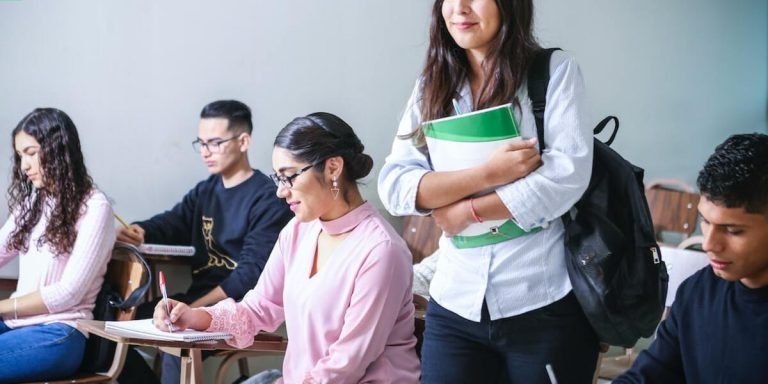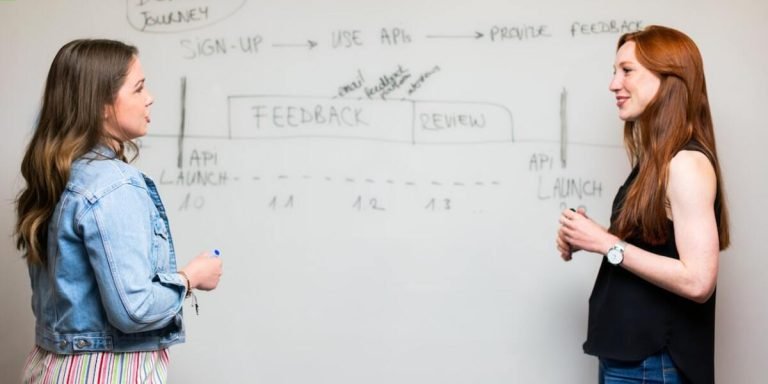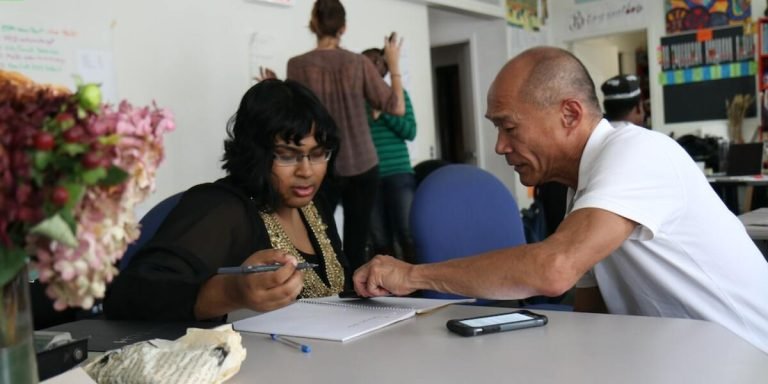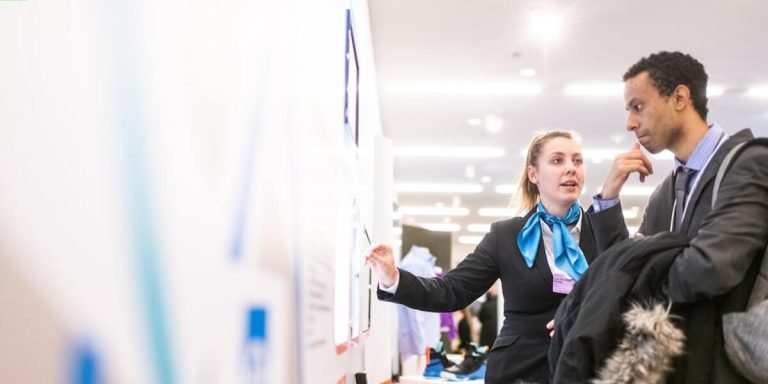Teacher Professional Development Workshops: Enhancing Classroom Skills and Strategies
Teacher professional development workshops present an opportunity for educators to evolve their teaching skills and discover new strategies. These programs are not just about expanding the know-how of teachers; they offer a chance to develop better classroom management techniques, implement creative learning resources, and construct effective curriculum plans that can significantly enrich each student’s educational journey.
However, ensuring effective implementation is not always straightforward for parents or fellow educators supporting these initiatives. With so much focus on enhancing the teacher’s pedagogical prowess through these workshops, it becomes equally essential to ensure that this knowledge transition translates into practical education in classrooms. This involves understanding how best to support teachers post-workshops – be it via assisting with strategy rollout or providing constructive feedback loops throughout the process.
Did you know?
A study by the National Staff Development Council found that teachers who received substantial professional development (an average of 49 hours) saw their students’ achievement scores increase by about 21 percentile points.
Enhancing Classroom Effectiveness Through Teacher Professional Development Workshops
Teacher professional development workshops have emerged as crucial catalysts in enhancing classroom effectiveness, particularly under the lens of technology integration in education. Housed within these dedicated platforms lie transformative strategies that empower educators to harness cutting-edge tools and techniques effectively. In 2023, given our rapid technological advancements and a sharp shift towards digitalization post-pandemic era, mastering tech integrations has become both indispensable and inevitable for every forward-thinking educator.
At the heart of it all lies a foundational understanding: Professional development is not merely about learning how to operate new devices or software; rather it’s about enabling an immersive environment conducive for students’ holistic growth. Educators learn ways to facilitate interactive sessions where technology complements traditional teaching methodologies instead of replacing them entirely. The goal is more profound than being technologically adept—it’s leveraging this knowledge to enhance cognitive skills among young learners.
Add-on support from parents enhances the efficiency manifold—bridging home-school gap significantly while reinforcing similar practices across different environments children interact with daily.
Furthermore, professional teacher workshops frequently offer resources specifically designed for parent-involvement activities ensuring their integral role in their child’s education isn’t compromised due to lack of technical know-how.
Integrating Innovative Teaching Strategies Post-Workshop
In the increasingly digital age, teacher professional development workshops play a pivotal role in equipping educators with new strategies for enhancing classroom effectiveness. One of the most practical takeaways from these sessions centers around integrating innovative teaching methods and how technology can be seamlessly incorporated into traditional education settings.
Post-workshop teachers find themselves better equipped to engage students using tools that are both modern and interactive. They come away with an enriched knowledge base on multiple apps and web-based platforms, widening their arsenal beyond textbooks and lectures alone.
Digital classrooms have become more than just a trend – they’re almost mandatory now due to 2023’s current online learning environment necessitated by global circumstances. Technology is not seen as replacing but rather supplementing tried-and-true teaching practices affording children access to diverse content at their fingertips enriching their understanding through varied perspectives.
Teachers learn effective approaches like blended learning models where face-to-face instruction meets e-learning; flipped classrooms where pre-recorded lessons encourage self-paced study; gamified quizzes which make evaluations fun yet insightful or collaborative projects fostering team spirit whilst honing problem-solving skills virtually!
These technological integrations while novel do require careful planning, implementation & follow-up – something evident throughout well-curated “teacher professional development workshops.” Sessions often include lesson demonstrations allowing participants hands-on experience navigating resources before employing them live within classes ensuring smoother transitions when adopting virtual pedagogies.
Measuring the Impact of Continued Education on Student Outcomes
In the evolving landscape of education, teacher professional development workshops have become a crucial component to continually improve teaching methods and enhance classroom effectiveness. These workshops can range from comprehensive training courses to collaborative forum discussions or even intensive seminars focused on specific new-age educational strategies like technology integration in education.
The impact of these continued education efforts by teachers is best measured through various student outcomes. Academic performance undoubtedly forms one critical yardstick which encompasses grades, test scores and homework completion rate among others but it’s not just limited there.
A key aspect where this impact reflects is students’ engagement levels – both within their classrooms as well as with their coursework at home. Post workshop implementations often reveal an increase in active participation during class time including questioning, group activities, project submissions all indicating improved interest towards their lessons.
Another essential element that showcases the effects significantly are behavioral changes observed amongst students over time such as better adaptability with academic pressures; fewer instances of misbehavior; increased enthusiasm for learning etc., proving positive influence stemming right from invigorated teaching methodologies introduced via developmental programs for educators.
Furthermore, 21st-century skills – encompassing communication abilities , problem-solving quirks , teamwork efficiency etc., also exhibit marked improvements following effective implementation post teacher professional development workshops centered around technological advancements .
Lastly yet importantly comes parent satisfaction level . Parents being observant spectators witness noticeable differences in terms of derived value manifesting through enhanced learner capacities and holistic consciousness about global issues integrated into everyday curriculum by tech-empowered enthusiastic mentors.
Fostering Collaborative Networks in Teacher Professional Development Programs
In the ever-evolving landscape of education, fostering collaborative networks in teacher professional development programs has become an invaluable asset. More so when it comes to technology integration in education — a realm that is undergoing continuous growth and innovation, especially now in 2023. Teacher PD workshops serve as crucial platforms where educators from different parts of the world can come together; they exchange best practices on how new technological tools can be harnessed for optimized student engagement.
Such collaboration-rich environments have proven instrumental not just for teachers but also parents looking to support their children’s learning journey better. As most households are increasingly becoming blended with digital elements, understanding available educational technologies will enable them to ensure that students are receiving a comprehensive approach at home too.
These interactions lead towards a richer pool of knowledge and shared experiences – those which single-handedly cannot be acquired by individual educators or families siloed off within their own teaching or parenting strategies. By engaging actively with colleagues during these professional development workshops, both parties stand to gain an upgraded skill set readying them effectively for tomorrow’s classrooms while extending well-rounded nurturement beyond school walls.
Building Support Systems Among Educators for Knowledge Exchange
In today’s dynamic digital age, the importance of technology integration in education cannot be overstated. Building support systems among educators can go beyond theoretical discussions around pedagogical practices and provide a practical platform for knowledge exchange. This is particularly important when it comes to teacher professional development workshops that have increasingly become an integral part of educational institutions across the globe.
Learning from one another is at the heart of these collaborative networks formed by teachers attending such workshops. They share noteworthy experiences, effective teaching strategies, curriculum innovations and creative solutions to everyday classroom challenges – all aimed towards enhancing student learning outcomes.
The process begins with identifying shared interests or common concerns within this diverse group who are already vested in improving their skills through teacher professional development workshops. It could range from dealing with distracted students due to excessive technological distractions like social media usage during class time or integrating cutting-edge virtual reality tools for science lessons without overwhelming young minds.
Leveraging Peer Observations for Practical Skill Enhancement
Peer observations have transformed the landscape of teacher professional development workshops, especially in terms of integrating technology. Rather than relying solely on theory, these sessions depend heavily on practical experience and shared learning endeavors – an essential part of today’s evolving educational environment.
Primary to this methodology is valuing each educator as a source of knowledge. Teachers often possess unique and valuable insights into effective strategies for incorporating technology within their classrooms. Peer observation provides opportunities for teachers to share their innovative methods with others while also gaining new ideas from fellow educators.
To effectively utilize peer observations during teacher professional development workshops, consider the following points:
- Engage teachers in a pre-observation meeting to clarify objectives and expectations.
- Ensure that observations focus on specific teaching practices or student-learning strategies.
- Provide observers with a structured observation tool or protocol to guide their feedback.
- Arrange for immediate post-observation discussions to reflect on and analyze the observed lesson.
- Encourage constructive feedback that is both specific and actionable for the observed teacher.
Regularly scheduled observational feedback: Workshops should schedule frequent rounds where participants observe one another applying newly acquired skills or technologies during model classes or activities. Feedback after such demonstrations helps peers troubleshoot issues together, fostering collaborative problem solving that benefits everyone involved.
Promotion of healthy discussions: Active sharing promotes communication between teachers with varying levels expertise in tech integration practices, allowing them to learn not just about different approaches but also varied classroom scenarios and potential challenges they might encounter when implementing similar measures at home schools.
Tailoring Teacher Professional Development to Meet Diverse Learning Needs
In the modern era of 2023, teacher professional development workshops have become a vital tool to build and hone skills that cater to diverse learning needs. The concept is no longer restricted to traditional chalk-and-board modes but has seamlessly integrated technology in education. This transformation is pivotal considering how different learners are and their consumption patterns vary.
Adapting such an adjustment necessitates tailor-made strategies during these professional growth sessions for teachers. By attending well-structured training courses focused on incorporating instructional technology into classrooms, educators can develop more engaging methods to facilitate student comprehension better. Technology integration works hand-in-hand with individualized instruction strategy – it assists in meeting each learner right at their competency level while leveraging tools designed based on universal design principles.
Parent and educator support plays an integral role here as they work closely together creating a conducive environment promoting technological literacy among students. They learn about innovative educational apps or online platforms through detailed walkthroughs held during these workshops which aids them help children navigate digital spaces confidently yet safely.
To create this synergy between classroom teaching methodologies and tech tools accessible edtech startups often conduct teacher-focused webinars offering expert insights which gives them hands-on experience over new-age pedagogies like blended learning or flipped classrooms all aimed towards making versatile academicians ready for future generations workplaces’ expectations.
Customizing Workshop Content for Inclusive Education Practices
To fulfill the complex learning needs of diverse students, teacher professional development workshops should evolve with a strong focus on inclusive education practices. Workshops should be tailored to meet specific teachers’ requirements while also aligning with current technological trends in 2023.
When customizing content for these workshops, organizers must keep an emphasis on technology integration within educational frameworks. Considering the various digital tools and platforms currently employed in classrooms, it’s vital to develop educators’ tech proficiency levels. Incorporation of modules that entail using adaptive technologies or software designed for special education could prove beneficial in reaching out to children who have different learning abilities.
For instance, teaching about applications like ‘Read&Write’, which helps dyslexic kids by reading aloud text from the screen, is one way forward. Similarly explaining how virtual reality can transform lessons into interactive experiences thus enhancing understanding among visually impaired students could resultantly foster more ‘inclusive’ classrooms.
In addition to this hands-on training concerning ed-tech tools and services would help teachers assist their pupils better during remote learning sessions; something synonymous post- pandemic era’s new normal schooling style . As we all know uninterrupted access remains quintessential part of digital inclusion hence discussing strategies ensuring smooth e-learning experience for disadvantaged student groups too holds paramount importance .
Addressing Different Educational Settings with Specialized Training Modules
In our ever-evolving educational landscape, prioritizing teacher professional development workshops has become a necessity. These workshops allow educators to embrace current trends in education technology and adapt their teaching strategies accordingly.
Specialized training modules are an excellent approach as they cater individually to diverse learning needs. They provide flexibility for teachers dealing with different educational settings – from traditional classroom setups to online schooling or even homeschooling.
One of the most significant benefits of these specialized training modules is their tailor-made content focused on addressing unique challenges that come with varying educational environments. Be it managing virtual classrooms effectively or engaging students in a home-learning setting; each workshop provides practical guidance based around real-life scenarios.
Furthermore, integrating advanced technology into such programs boosts their efficiency manifold. When equipped with tools like augmented reality (AR), virtual reality (VR), artificial intelligence (AI) and cloud computing, teachers find it easier enhancing collaborative learning even beyond physical boundaries.
Moreover, investing time in these developmental workshops promotes individual growth among participating educators while enriching overall student outcomes – a win-win scenario! Various studies conducted throughout 2023 have highlighted the positive impact active engagement at such platforms can make towards improving young learners’ interaction levels irrespective of the curriculum’s complexity level.
Conclusion
In a rapidly evolving educational landscape, teacher professional development workshops serve as the guiding light for educators seeking to enhance their classroom skills and strategies. They not only equip teachers with advanced teaching tactics but also foster an environment of innovation in education that enhances the learning experience for students.
However, this is just a snapshot of what these developmental programs can offer. We invite you to explore our website further where we delve deeper into numerous aspects concerning childhood education and support resources available for parents and educators alike! Stay awhile; discover practical ways to help children shine both academically and socially through our expert-guided content.
Remember, great classrooms are built by well-informed teachers – be one today!







